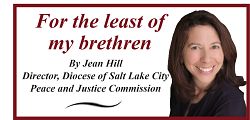2019 Utah Legislative Session Leaves Many Lacking
Utah’s 45-day legislative session often feels far too long, especially when the session begins, as it did this year, with a huge effort to overturn a hard-won initiative battle.
Thankfully, legislative efforts to undermine the Medicaid expansion initiative were not entirely successful. Though the final bill made a number of problematic changes to the expansion voters enacted, full expansion remains possible if the federal government decides not to grant the second of the two waivers Utah is seeking. (The first waiver already has been granted as expected.) It’s pretty clear, however, that legislators do not want a full expansion, so expect more changes to come if the waiver request for full federal funding without full expansion is denied.
As concerning as legislators’ work to overrule the initiative vote was, equally concerning was the failure to see the forest through the trees. During the remainder of the session, legislators were willing to consider spending substantial sums on affordable housing, though the final appropriation was cut in light of the tax bill failure. They, rightly, sought more accountability in the state homeless services system in a bill that passed, and even considered adding a state Earned-Income Tax Credit in the doomed tax overhaul. As important as each of these measures was, not one will move the needle on poverty and homelessness in this state in a meaningful way without the other, and much more.
For example, developing a more streamlined homeless services system is important, but if there is no housing available, even the ablest person won’t be moving out of emergency shelter. And if the person does find housing and a part-time job but should find him- or herself too ill to work and lacking access to Medicaid, the house will soon be gone, especially given Utah’s overly landlord-friendly eviction laws.
It is the rare bill that doesn’t impact some other area of citizens’ lives beyond the subject of the bill. Seeing the connections requires time and a will to look at the big picture, both of which are often lacking during the frenzy of the legislative session.
The other troubling aspect of many legislative sessions, including this year’s, is the tendency of legislators to want to try things out in the dark before unveiling major policy changes to the public. This was best illustrated in the 441-page tax overhaul. Revising the state’s entire tax structure is a massive undertaking, one that legislators have been working on for several years. Unfortunately, legislators have done most of that work behind closed doors. Not surprisingly in a legislature that began the session by telling voters who supported Medicaid expansion that we aren’t as smart as they are, legislators failed to anticipate the outcry they heard when they sprang the bill on the public halfway through the session. Once the impacted businesses with heavy lobbying presence on the hill spoke, legislators wisely chose to shelve the bill pending further discussion. We can only hope legislators will carry on that discussion in broad daylight during the interim.
The most troubling aspect of any legislative session from a Catholic view, however, is the lack of a consistent ethic of life on Capitol Hill. Legislators were more than willing to protect the unborn, or at least some of the unborn, through bills to prohibit abortions for babies diagnosed with one disability, Down syndrome, but not other disabilities, and for babies who reach 18 weeks of gestation. On the other hand, they were completely unwilling to even consider the idea of allowing a family member to petition a court for an order to remove guns from the home of someone showing clear signs of misusing their weapons to harm self or others. Meanwhile, they also strengthened Utah’s “shoot first, ask questions later law,” pre-determining what evidence courts may consider when a person claims use of a weapon was in self-defense.
Legislative response to public outcry on any issue was the same as it always is – take your protest to the voting booth. Legislators know better than most just how safe they are when Utah votes, so don’t expect many changes in their willingness to listen to the common man and woman until we start making some changes in our voting patterns.
Meanwhile, Catholic Utah, we have much work to do educating ourselves and our legislators about Catholic teaching and our consistent ethic of life.
Jean Hill is director of the Diocese of Salt Lake City Office of Life, Justice and Peace.
© Copyright 2025 The Diocese of Salt Lake City. All rights reserved.


Stay Connected With Us